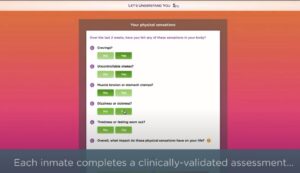This is a guest post by Steph Dugdale, researcher at Breaking Free Online.
The development of signposting to online resources
Increasingly, people are accessing support for their substance misuse recovery via the internet. This online support includes information resources, online treatment programmes, recovery maintenance support, and harm reduction advice. However, despite the growing range of online resources for those working on overcoming their drug and alcohol difficulties, there is currently very little guidance for treatment services as to how they might best utilise these online resources to support their service users. Therefore, researchers at Breaking Free Group and in2recovery wanted to investigate this further.
Breaking Free Group provides online therapeutic support for people trying to reduce or stop using alcohol and drugs, and in2recovery provides an online space for recovery forums and communities. This collaborative research project aimed to investigate what kinds of online recovery resources are available, and to understand who is using these resources and for what purpose. The purpose of this research was to develop an online signposting resource, to direct service users and practitioners working in the sector to appropriate and relevant online support for treatment and recovery from substance misuse difficulties.

The research
In keeping with the online theme of the research, an internet-based survey was used to ask participants about the kinds of online recovery resources they had come across. This survey was followed by live-chat or email interviews, which were conducted with a sample of the survey participants, and discussed the ways in which these online recovery resources are used and why.
A total of 130 people completed the initial internet-based survey. Participants identified themselves as belonging to one of three recovery status groups:
- 12% reported that they were currently working towards their recovery by actively reducing or stopping their substance use;
- 56% said they were in maintained recovery and currently abstinent; and
- 32% said that they currently did not have any difficulties with drugs or alcohol.
Participants in the survey reported that recovery support forums were the most accessed online resource, with these including social media websites such as Facebook and Twitter. Participants also reported that the evening was the most popular time of day to use these online resources, which would indicate that these online resources may provide an additional source of support outside of traditional ‘offline’ face-to-face service opening hours.

Comparison
When the three different recovery status groups that took part in the survey were compared, it was found that individuals who were actively working towards their recovery were more likely to access therapeutic resources than the other two groups. These therapeutic resources included programmes and interventions that explore the underlying causes behind substance misuse, and provide support to people to develop coping skills to help them manage these difficulties. This would appear to make sense, as this group of participants were actively working on managing their difficulties with drugs and alcohol. This finding would also suggest that specific types of online resource may be more relevant at different stages of recovery.

Extending support
For the live-chat and email interviews, 16 people participated. The interviews were conducted either via Skype or Facebook messenger in ‘real-time’, or via email, which meant there were time lapses between questions being asked by the researchers and replies being received from the participants. Information gathered from the interviews reinforced the finding from the survey that online recovery resources increase access to support beyond traditional offline treatment services. This included the ability for individuals to access online resources during evenings and weekends, and to supplement face-to-face support, for instance if a member of staff working in a treatment service is unavailable.
This suggests that online and offline recovery resources may complement and support one another. Online support was also suggested to be of benefit for those who were maintaining their recovery, by enabling them to make social connections with other people in recovery, and continue to build upon their ‘recovery capital’. Of interest though, was the perception amongst interview participants, that there was an overall lack of signposting available to direct people to appropriate online resources.
 Next steps
Next steps
Following this research, Breaking Free Group have worked alongside Learning to Live Again to refine the list of online recovery resources that were generated by the online survey – you can see the key resources in the series of graphics in this blog post. The Learning to Live Again group is run by people in Leeds who are in long-term recovery. The purpose of the group is to support one another to maintain their recovery from substance misuse, and to provide peer support to other people in the community who are currently working towards their recovery.
As the findings from this research suggested that different recovery status groups may benefit from different kinds of online recovery resources, the resources were separated out to direct people to those that might be most useful for them specifically. From this, a signposting document was produced. This signposting document is for those accessing support for their own substance misuse difficulties, for friends and family concerned about a loved one, or for professionals working to support those in recovery. Although the current document is UK specific, there are plans to develop this research internationally.
Please feel free to share this signposting document within your own service, or to people who may benefit from it. If you would like to read the original research paper, you can access it here.
Blog posts in the drug and alcohol category are kindly sponsored by Breaking Free Group which has developed a powerful and adaptable digital health platform which targets the underlying psychological and lifestyle factors that drive addictive behaviours. Breaking Free has no editorial influence on the contents of this site.


 Next steps
Next steps




